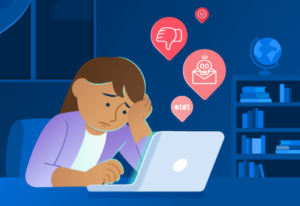
Cyberbullying : Effects on Mental Health
Particularly among young people, the emergence of cyberbullying becomes a major issue in our more digitized environment. This page explores the nature of cyberbullying, its several manifestations and the significant consequences it may have on mental health.
Definition of cyberbullying
Cyberbullying consists of leveraging digital platforms to inflict emotional distress or intimidation on others.
Unlike conventional bullying, which usually takes place in person, cyberbullying can happen anywhere, at any moment as long as the offender has internet access. This omnipresence makes it exceptionally difficult and sneaky to fight.
Styles of Cyberbullying
Cyberbullying can show up as many different things, including:
Harassment : Continually forwarding threatening or insulting communications.
Making false accounts to pass for someone and harm their reputation is known as impersonation.
Doxxing is divulging private information without permission that results in threats or harassment.
Exclusion: Designed to induce loneliness, purposefully barring someone from internet groups or activities.
Posting offensive remarks to set off emotions and cause discomfort is known as trolling.
From social media sites to online gaming communities, these acts can take place on many platforms, hence it is essential to know their consequences.
Cyberbullying’s Commonness
Recent research show that cyberbullying is shockingly really common. A poll by the Cyberbullying Research Center shows that about 37% of young people between the ages of 12 and 17 had at some point in their life encountered cyberbullying. This figure emphasizes the critical requirement of awareness and preventive measures.
Social Media’s Function
Cyberbullying is proliferated in great part on social media sites. The internet’s anonymity and distance help bullies feel more confident and more willing to act negatively. Moreover, the viral character of internet content implies that negative statements could spread quickly, so enhancing their influence.
Cyberbullying’s Effects on Mental Health
Cyberbullying can have extreme and long-lasting repercussions on mental health. Many times, victims deal with a spectrum of psychological problems including:
1. Anxiety:
Many people who deal with cyberbullying claim higher degrees of anxiety. A condition of hyper-vigilance might result from a continuous worry of nasty remarks or online targeted attack. Many spheres of life, including social contacts and academic achievement, might be affected by this anxiety.
2. Depression:
Cyberbullying has been connected to a higher depressive risk. Victims could develop poor self-esteem since they feel alienated and forlorn. This emotional chaos reveals the seriousness of the issue, as it can give rise to occasional suicidal thoughts or actions.
3. Negative Self-Esteem
Negative messages taken repeatedly can seriously affect someone’s self-worth. Those who absorb the bullying could develop a warped self-image. This poor self-esteem can impede both personal and professional development, therefore sustaining a negative cycle.
4. Research Difficulties
Cyberbullying’s emotional suffering and stress might show up in scholastic performance. Concentrating on their schoolwork can be difficult for victims, which would result in deteriorating marks and a lack of drive. This academic drop can aggravate sense of worthlessness even more.

The knock-on effects on friends and family
Cyberbullying can have effects on friends and family in addition to the victim. Those who see cyberbullying could feel shame for not intervening or powerlessness or worry. Watching their loved ones suffer causes family members to become depressed, which strains relationships and creates an unpleasant home atmosphere.
Victim Coping Mechanisms
Although cyberbullying can have terrible repercussions, victims have coping mechanisms to use:
1. Requesting Assistance
Getting help from friends, relatives or mental health experts is among the best strategies to counteract the bad consequences of cyberbullying. Discussing events might help to validate and ease problems.
2. Restrain Internet Access
Limiting their online presence or allowing pauses from social media could help victims. This adjustment can provide individuals with a necessary pause from negativity and lessen the probability of meeting bullies.
3. Recording Event Occasions
Maintaining documentation of bullying events is quite important, particularly in cases when victims choose to disclose the behavior. Having documentation backs up their claims and enables authorities to intervene based on it.
4. Participating in Positive Recreation
Participating in sports, hobbies, or other constructive activities helps victims restore their self-esteem and discover happiness away from their internet encounters. These pursuits provide a healthy release for their emotions.
Preventive Measures
Eradicating cyberbullying requires a partnership between individuals, families, organizations, and local communities.
These methods deserve your attention:
1. Awareness and Learning
Crucially, increasing knowledge of the warning indicators and consequences of cyberbullying is Programmes teaching young people about appropriate internet behaviour and the value of empathy can be carried out by schools and local groups.
2. honest correspondence
Encouragement of honest discussion regarding online experiences will enable people to feel confident sharing any problems they encounter. Children should be free to share their worries in the surroundings thanks of parents and guardians.
3. Track Online Behavior
Although privacy is crucial, keeping an eye on a child’s internet activities could assist spot possible bullying scenarios. Using tools and programs meant to monitor internet contacts, parents can monitor online interactions and step in if needed.
4. Clearly Specifying Guidelines
Clear rules for internet activity inside homes and businesses will assist to foster a respectful and compassionate society. Promoting good relationships and discouraging bad ones will help to lower the possibility of cyberbullying events.
The Function of Education
Fighting cyberbullying depends much on schools. It is particularly crucial to establish comprehensive anti-bullying policies that specifically address cyberbullying.
These laws should incorporate:
1. Reporting System Mechanisms
Schools should have explicit policies for documenting instances of cyberbullying. Coming forward with their experiences should make students protected and supported.
2. Advice Services
Giving victims of cyberbullying access to counseling helps them to deal with their situations. Schools should make sure that easily accessible mental health resources abound.
3. Training Courses and Workshops
Frequent seminars and training courses can inform staff, teachers and students regarding cyberbullying and its consequences. By encouraging empathy and understanding, these initiatives help to create a more encouraging classroom.
Social Media Platforms: Their Function
Social media firms owe it to their users to establish secure online environments. To fight cyberbullying, they might follow many actions:
1. Tools for Reporting:
Giving users simple reporting options will enable them to document events of cyberbullying. These reports should be given top priority on social networking sites, which should also react quickly against bullies.
2. Materials for Education
Platforms can provide instructional tools on spotting and tackling cyberbullying. Social media firms can help to create a more favorable online community by raising awareness.
3. Method Changes in Algorithms
Changing algorithms to find and minimize offensive material can help to lower the cyberbullying’s profile. Positive interactions should be given top priority so that social media firms help to create a better online space.
At last
One ubiquitous problem with terrible consequences on mental health is cyberbullying. Developing successful preventive and intervention plans depends on an awareness of its forms, frequency, and consequences. Working together, we can fight cyberbullying and safeguard people’s mental health, especially that of young people, by supporting honest communication, raising awareness and creating positive surroundings.
Call to Action
Seek help if you or someone you know are victims of cyberbullying without delay. See friends, relatives or mental health experts. Working together, we can build a more compassionate, safer internet environment.